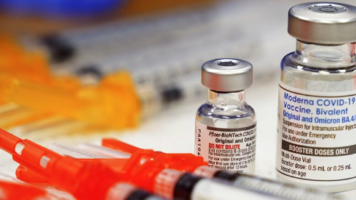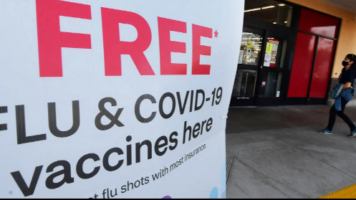COVID-19 News
COVID-19 Update | July 28, 2023
July 28, 2023

The California Biotechnology Foundation is committed to keeping you up to date about COVID-19 testing, treatment and prevention advancements. The following resources track what progress has been made as of July 28, 2023. Notable advancements include:
- According to new research, an anti-inflammatory drug commonly used to treat gout could significantly improve outcomes in patients with mild-to-moderate COVID-19 infections.
- A recent study published in JAMA Network Open suggests mRNA COVID-19 vaccination during pregnancy provides immunity for the infant about 6 months after birth.
- The US Food and Drug Administration granted Emergency Use Authorization for a home-use COVID-19 antigen test from Immunities.
Recent News
- Commonly used drug effective against COVID-19
UGA Today – July 27, 2023
An anti-inflammatory drug commonly used to treat gout could significantly improve outcomes in patients with mild-to-moderate COVID-19 infections, according to research by a team led by University of Georgia professor Ralph Tripp. In a dose-range study of probenecid, a drug originally approved in 1951 to prevent the production of gout-causing uric acid, researchers showed significant improvements both in preventing the transmission of COVID-19 and the speed at which symptoms cleared in patients. In comparison to other FDA-approved drugs used to treat the virus, probenecid helped clear symptoms several days faster, Tripp said. - U.S. sees biggest rise in COVID-19 hospitalizations since December
CBS News – July 25, 2023
Weekly COVID-19 hospitalizations have risen by more than 10% across the country, according to new data published by the Centers for Disease Control and Prevention, marking the largest percent increase in this key indicator of the virus since December. At least 7,109 admissions of patients diagnosed with COVID-19 were reported for the week of July 15 nationwide, the CDC said, up from 6,444 during the week before. - Off-Label Meds: Promising Long COVID-19 Treatments?
Medscape – July 24, 2023
Doctors who treat patients with long COVID-19, hampered by a lack of federally approved treatments, are turning to off-label use of drugs designed for addiction, diabetes, and other conditions. Those with long COVID-19 for years now are engaging in robust online conversations about a range of treatments not formally approved by the US Food and Drug Administration for the condition, reporting good and bad results. High on the current list: low-dose naltrexone (LDN). A version of drug developed to help addicts has been shown to help some long COVID-19 patients. But evidence is building for other treatments, many of them targeted to treat brain fog or one of the other long-term symptoms in individuals 3 months or more after acute COVID-19 infection. - COVID-19 vaccine during pregnancy provides mother-infant immunity
Contemporary Pediatrics – July 21, 2023
According to a recent study published in JAMA Network Open, messenger RNA (mRNA) COVID-19 vaccination during pregnancy provides an immunoglobulin G (IgG) response for the mother-infant dyad for about 6 months after birth. COVID-19 infection during pregnancy has been linked to increased risks of severe illness, mortality, and pregnancy-related complications. As data has indicated safety and efficacy when using the mRNA COVID-19 vaccine during pregnancy, public health officials have recommended vaccination before, during, and after pregnancy. - FDA Grants Emergency Use Authorization for Immunostics Home-Use COVID-19 Antigen Test
360 DX – July 21, 2023
The US Food and Drug Administration granted Emergency Use Authorization for a home-use COVID-19 antigen test from Immunostics. The Swab-N-Go Home Test COVID-19 Ag test is a nonprescription lateral flow immunoassay designed for the qualitative detection of SARS-CoV-2 nucleocapsid protein antigen using self-collected anterior nasal swab samples from adults and children ages 14 years and older and adult-collected samples from children younger than 14 years, according to the FDA. - Long COVID-19 Seen in 16.2 Percent of Pediatric COVID-19 Patients
Health Day – July 21, 2023
Overall, 16.2 percent of the pediatric population experience one or more persistent symptoms at least three months after COVID-19, according to a review published online in Pediatrics. Li Jiang, M.D., M.P.H., from the Hospital for Sick Children in Toronto, and colleagues conducted a systematic review to examine the prevalence and characteristics of the long-term clinical features of COVID-19 (long COVID-19) in the global pediatric population (aged 0 to 19 years). Published articles and preprints from December 2019 to December 2022 were included; 27 cohorts and four cross-sectional studies involving more than 15,000 pediatric participants met the inclusion criteria. The researchers found reports of more than 20 persistent symptoms and clinical features among children and adolescents. - Study offers first evidence of a genetic basis for why some have no symptoms with COVID-19
University of Minnesota Center for Infectious Disease Research and Policy – July 20, 2023
A common genetic mutation may be why some people have COVID-19 but have no symptoms, according to a University of California, San Francisco (UCSF)–led study published yesterday in Nature. The researchers noted that at least 20% of people with COVID-19 infections never feel ill. “Although most global efforts have focused on severe illness in COVID-19, examining asymptomatic infection provides a unique opportunity to consider early immunological features that promote rapid viral clearance,” they wrote. - Study shows bivalent COVID-19 booster outperforms monovalent version
University of Minnesota Center for Infectious Disease Research and Policy – July 19, 2023
A new study finds that estimated relative vaccine effectiveness was 49.3% for the bivalent (two-strain) booster and 26.9% for the monovalent (single-strain) booster, with protection lasting at least 4 months for the bivalent booster and waning fast for the monovalent version. The study appears in The Lancet Infectious Diseases. The study was conducted using data from the Italian vaccination registry and SARS-CoV-2 surveillance system, which quantified confirmed infections between September 12, 2022, and January 7, 2023. COVID-19 cases were matched among persons aged 60 years or older who received a second booster and those who had received only the first booster at least 120 days earlier. A total of 2,129,559 matched pairs were included
Rely on California Biotechnology Foundation to monitor breaking news and provide updates on the latest advancements in COVID-19 diagnostics, vaccines and treatments.
Stay informed on the latest news and trends on the economic and health benefits of this industry by visiting the new CABiotech.org
If you have any questions about hosting informational briefings for your colleagues serving in the legislature, contact California Biotechnology Foundation Executive Director Patty Cooper at (916)764-2434 or [email protected].


